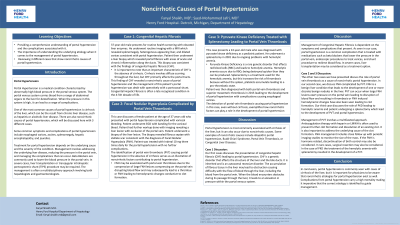Tuesday Poster Session
Category: Liver
P3965 - Noncirrhotic Causes of Portal Hypertension
Tuesday, October 24, 2023
10:30 AM - 4:00 PM PT
Location: Exhibit Hall

Has Audio
- FS
Faryal P. Shaikh, MD
Henry Ford Hospital
Clinton Township, MI
Presenting Author(s)
Award: Presidential Poster Award
Faryal P. Shaikh, MD1, Syed-Mohammed Jafri, MD2
1Henry Ford Hospital, Clinton Township, MI; 2Henry Ford Health System, Detroit, MI
Introduction: Portal Hypertension is elevated pressure within the portal venous system, a common complication of liver disease. More rare causes and outcomes of these cases are less described. We evaluated patients with a history of portal hypertension and outcomes of patients with portal hypertension due to atypical causes of disease.
Case Description/Methods: Case 1: 32 year old female with a history portal hypertension due to focal nodular hyperplasia complicated by portal vein thrombosis with variceal bleed. Patient had variceal bleeding at the age of 13 treated with esophagogastroduodenoscopy with banding. Her imaging showed liver lesions and occlusion of the portal vein and splenic vein thrombosis. She underwent biopsy showing fibrous septae with stellate scar consistent with focal nodular hyperplasia. Patient continues on Inderal 10 mg three times daily without any acute complications.
Case 2: 37 year old male presented with elevated liver enzymes. MRI showed an enlarged spleen, heterogenous appearing liver, portal vein and superior mesenteric vein thrombosis and dilated varices. Biopsy showed hepatic fibrosis with areas of hepatocytes showing acute and chronic inflammation along with bland ductal proliferation consistent with congenital hepatic fibrosis. Managed operatively by splenectomy and portocaval shunt. Congenital hepatic fibrosis a late recognized condition in the 4-5th decade of life, bile ducts are deformed causing scaring and fibrosis.
Case 3: 24 year old male with a history of pyruvate kinase deficiency and recurrent portal vein thrombosis. He was diagnosed with portal vein and superior mesenteric vein thrombosis in 2015 causing portal hypertension and esophageal varices. Pyruvate kinase deficiency leads to dehydration of red blood cells, which leads to hemolytic anemia. He underwent splenectomy in 2001 and afterwards had recurrent portal vein thrombosis. Studies show that hypercoagulability in patients with splenectomy is due to the changes in disrupted thrombogenic RBC membranes that normally are removed by the spleen.
Discussion: Portal hypertension is seen with liver cirrhosis caused by alcoholic liver disease or hepatitis. Here we have discussed some rare causes of noncirrhotic portal hypertension in the setting of focal nodular hyperplasia, congenital hepatic fibrosis, and pyruvate kinase deficiency. Complications related to elevated portal hypertension carry a high morbidity, so it is imperative to identify correct etiologies to guide management.
Disclosures:
Faryal P. Shaikh, MD1, Syed-Mohammed Jafri, MD2. P3965 - Noncirrhotic Causes of Portal Hypertension, ACG 2023 Annual Scientific Meeting Abstracts. Vancouver, BC, Canada: American College of Gastroenterology.
Faryal P. Shaikh, MD1, Syed-Mohammed Jafri, MD2
1Henry Ford Hospital, Clinton Township, MI; 2Henry Ford Health System, Detroit, MI
Introduction: Portal Hypertension is elevated pressure within the portal venous system, a common complication of liver disease. More rare causes and outcomes of these cases are less described. We evaluated patients with a history of portal hypertension and outcomes of patients with portal hypertension due to atypical causes of disease.
Case Description/Methods: Case 1: 32 year old female with a history portal hypertension due to focal nodular hyperplasia complicated by portal vein thrombosis with variceal bleed. Patient had variceal bleeding at the age of 13 treated with esophagogastroduodenoscopy with banding. Her imaging showed liver lesions and occlusion of the portal vein and splenic vein thrombosis. She underwent biopsy showing fibrous septae with stellate scar consistent with focal nodular hyperplasia. Patient continues on Inderal 10 mg three times daily without any acute complications.
Case 2: 37 year old male presented with elevated liver enzymes. MRI showed an enlarged spleen, heterogenous appearing liver, portal vein and superior mesenteric vein thrombosis and dilated varices. Biopsy showed hepatic fibrosis with areas of hepatocytes showing acute and chronic inflammation along with bland ductal proliferation consistent with congenital hepatic fibrosis. Managed operatively by splenectomy and portocaval shunt. Congenital hepatic fibrosis a late recognized condition in the 4-5th decade of life, bile ducts are deformed causing scaring and fibrosis.
Case 3: 24 year old male with a history of pyruvate kinase deficiency and recurrent portal vein thrombosis. He was diagnosed with portal vein and superior mesenteric vein thrombosis in 2015 causing portal hypertension and esophageal varices. Pyruvate kinase deficiency leads to dehydration of red blood cells, which leads to hemolytic anemia. He underwent splenectomy in 2001 and afterwards had recurrent portal vein thrombosis. Studies show that hypercoagulability in patients with splenectomy is due to the changes in disrupted thrombogenic RBC membranes that normally are removed by the spleen.
Discussion: Portal hypertension is seen with liver cirrhosis caused by alcoholic liver disease or hepatitis. Here we have discussed some rare causes of noncirrhotic portal hypertension in the setting of focal nodular hyperplasia, congenital hepatic fibrosis, and pyruvate kinase deficiency. Complications related to elevated portal hypertension carry a high morbidity, so it is imperative to identify correct etiologies to guide management.
Disclosures:
Faryal Shaikh indicated no relevant financial relationships.
Syed-Mohammed Jafri: Gilead, Takeda, Abbvie – Advisor or Review Panel Member, Speakers Bureau.
Faryal P. Shaikh, MD1, Syed-Mohammed Jafri, MD2. P3965 - Noncirrhotic Causes of Portal Hypertension, ACG 2023 Annual Scientific Meeting Abstracts. Vancouver, BC, Canada: American College of Gastroenterology.

